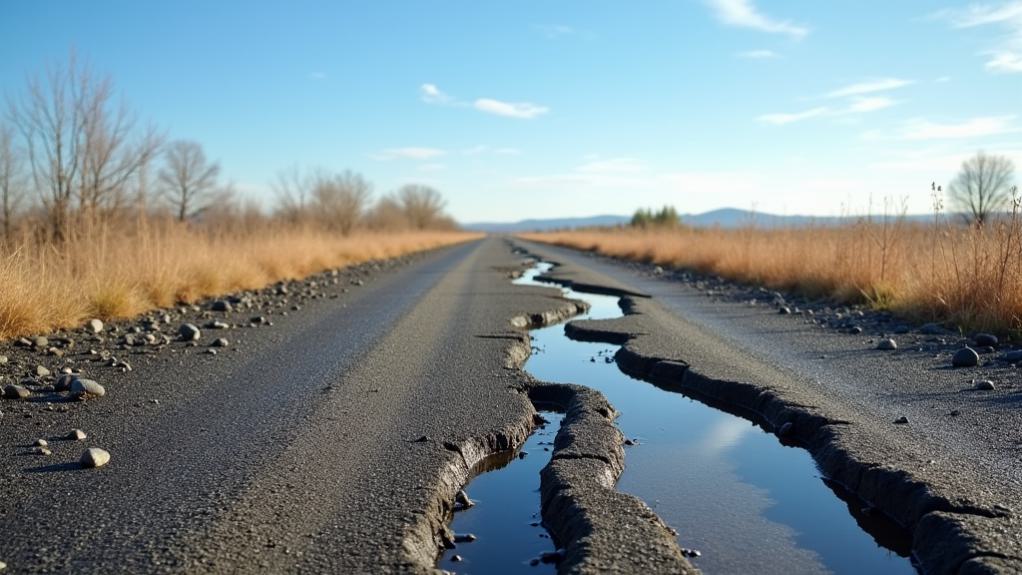Your asphalt driveway may be sinking due to several critical factors. Poor drainage often leads to water accumulation, eroding the soil beneath and causing instability. Heavy vehicle traffic compresses underlying soil, resulting in settling. Additionally, improper installation practices like inadequate compaction or insufficient base support can exacerbate the issue. Freeze-thaw cycles and tree root growth can further undermine integrity, creating voids. Keep an eye out for signs such as cracks or uneven surfaces that indicate underlying problems. Understanding these components is essential for effective solutions and prevention strategies. Exploring these aspects can help you effectively address your driveway’s sinking issues.
Key Takeaways
- Poor drainage can cause soil erosion beneath the asphalt, leading to sinking due to reduced load-bearing capacity.
- Heavy vehicle traffic compresses the soil over time, resulting in settling and uneven surfaces in the driveway.
- Improper installation, such as insufficient base preparation or inadequate depth, increases the risk of asphalt sinking.
- Freeze-thaw cycles destabilize the ground, contributing to structural issues and paving subsidence.
- Tree roots or utility line problems can create voids or destabilize the soil, leading to localized sinking in the asphalt.
Causes of Asphalt Driveway Sinking
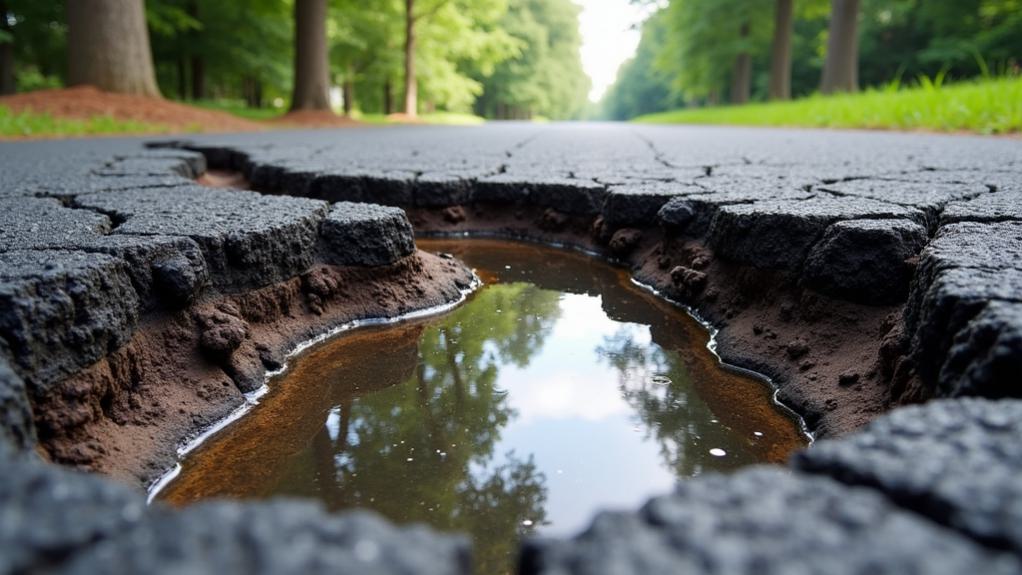
Several factors can contribute to asphalt driveway sinking, and understanding them is essential for effective maintenance. One major cause is poor drainage, which can lead to soil erosion.
When rainwater collects around your driveway or underground leaks occur, the soil supporting the asphalt may wash away, creating voids that result in sinking asphalt. To address these issues, services like comprehensive asphalt repair can help maintain the integrity of your driveway and prevent sinking.
Heavy vehicle traffic can also compress the soil beneath your driveway, leading to settling and uneven surfaces. If the asphalt was improperly installed, this risk is heightened.
Additionally, freeze-thaw cycles can destabilize the ground, as the repeated expansion and contraction of soil can exacerbate the sinking issue.
Tree roots pose another threat; they can push up asphalt or create voids as they grow, leading to localized sinking or uneven areas.
Finally, aging asphalt materials naturally degrade over time. Without proper maintenance and timely driveway repair, the weakened structure is more susceptible to sinking.
Signs of Sinking Problems
Recognizing the signs of sinking problems in your asphalt driveway is essential for timely intervention. One of the most obvious indicators is the appearance of cracks in the asphalt surface or localized sinking. These issues could stem from broken utility pipes that require immediate attention.
Additionally, if you notice sunken areas that retain standing water, this suggests accelerated soil erosion beneath your driveway, pointing to potential soil instability. Regular maintenance services, such as seal coating, can help protect your driveway from some of these issues, as highlighted by comprehensive asphalt paving services.
Nearby structures showing signs of sinking may indicate widespread soil problems affecting your driveway’s integrity. Pay attention to your landscape as well; stressed or dying plants could signal underground voids impacting their root systems, often linked to driveway instability.
Furthermore, uneven surfaces or large depressions in your driveway are critical signs of underlying soil instability that necessitate further investigation. Ignoring these signs can lead to more extensive damage and costly repairs down the line.
Impact of Utility Lines
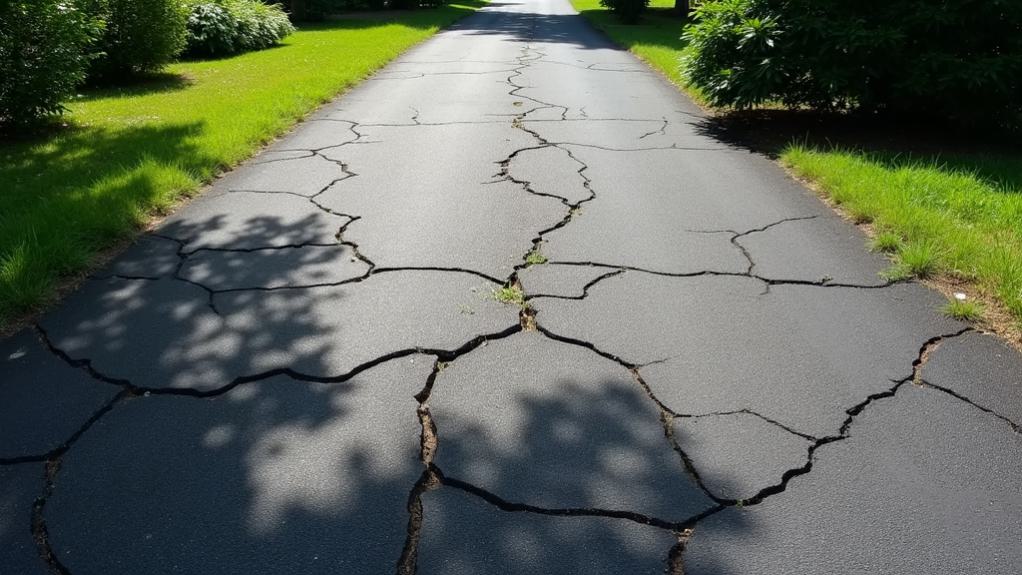
The stability of your asphalt driveway can be greatly impacted by the condition of nearby utility lines. When these lines break or become impaired, they can release significant amounts of water, leading to erosion beneath your driveway. This erosion creates voids that contribute to a sinking driveway and uneven surfaces.
Consider the following factors regarding utility lines:
- Damaged Pipes: Broken utility lines can cause water to escape, destabilizing the soil under your driveway.
- Soil Erosion: The escaping water exacerbates soil erosion, increasing the likelihood of driveway settling.
- Rusted Lines: Impaired utility pipes may worsen water issues, further destabilizing the foundation of your driveway.
- Proximity: The location of utility lines near or beneath your asphalt driveway directly affects its structural integrity.
Regular inspections of utility lines are essential to identify potential breaks before they lead to serious water issues. By addressing these problems promptly, you can maintain the stability of your asphalt driveway and prevent costly repairs in the future.
Understanding this connection is crucial for any homeowner facing a sinking driveway.
Effects of Poor Drainage
Utility line issues can often lead to drainage complications that further exacerbate the sinking of your asphalt driveway. Poor drainage can saturate the soil beneath your driveway, leading to soil erosion and destabilizing the ground. The loss of load-bearing capacity in saturated soil increases the risk of subsidence, which manifests as cracks and depressions in the asphalt.
Understanding the relationships between these factors is essential. The table below summarizes the effects of poor drainage on your asphalt driveway:
| Factor | Impact | Result |
|---|---|---|
| Soil Saturation | Decreased load-bearing capacity | Increased risk of sinking |
| Surface Runoff | Undercutting the pavement, creating voids | Subsidence over time |
| Soil Erosion | Compromised structural integrity | Cracking and uneven surfaces |
| Long-term Drainage Issues | Exacerbation of subsidence, extensive damage | Costly repairs required |
Consequences of Installation Errors
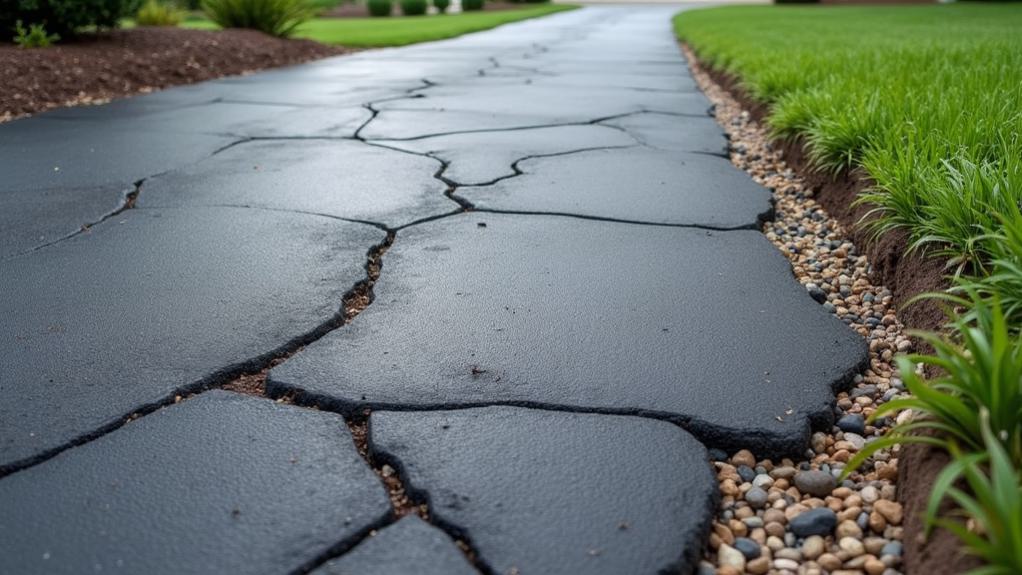
Installing an asphalt driveway without proper attention to detail can lead to significant long-term consequences. Trusted Asphalt Paving Services in Etters emphasize the importance of correct installation practices to avoid these pitfalls.
Installation errors can compromise the driveway’s integrity, resulting in issues that may require costly repairs. Here are four vital consequences of these errors:
- Insufficient Base Preparation: Without a solid base, the driveway can’t adequately support the weight of vehicles, leading to sinking.
- Poor Compaction: If the base layer isn’t compacted properly, it reduces stability, making the asphalt vulnerable to settling over time.
- Inadequate Depth: An insufficiently deep base fails to provide the necessary support, increasing the risk of structural failure and further sinking.
- Substandard Materials: Using inferior materials during asphalt paving can lead to subsidence, which decreases the driveway’s lifespan and overall integrity.
Neglecting these factors during installation not only affects the performance of your driveway but also leads to potential long-term issues that may not be easily fixed.
Addressing these errors early on is essential to maintaining your driveway’s functionality and avoiding significant repair costs in the future.
Importance of Regular Maintenance
Regular maintenance is essential for preserving the integrity of your asphalt driveway and extending its lifespan. By routinely inspecting and addressing minor issues like cracks or sunken areas, you can prevent them from escalating into costly repairs.
It’s advisable to conduct maintenance checks at least once a year, allowing you to seal coat the surface and protect it from water infiltration, which can erode the underlying base materials.
Implementing proper drainage solutions is also vital. Guarantee that downspouts direct water away from the driveway to minimize soil saturation and erosion, which can compromise stability.
Regular maintenance not only helps in maintaining the driveway’s appearance but also in identifying underlying problems, such as broken utility lines or inadequate compaction, that may contribute to sinking.
Additionally, addressing these issues early on will save you money in the long run. A neglected driveway can lead to significant repairs that could have been avoided with timely interventions.
Repair Options for Sinking Driveways
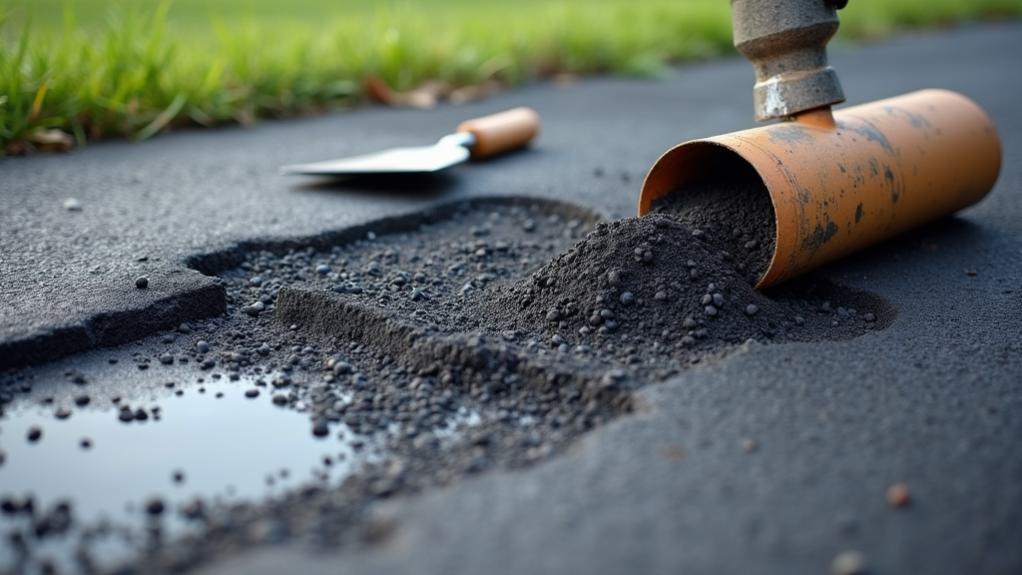
Even with diligent maintenance, you might still notice your asphalt driveway sinking due to various factors, including soil erosion or inadequate drainage.
To address this issue, consider the following repair options:
- Cold Patch: This temporary fix can fill in the sunken areas. However, it mightn’t harden effectively in high temperatures, so use it with caution.
- Milling and Repaving: A more extensive solution involves milling the existing surface and repaving over a properly prepared subgrade. This guarantees better compaction and reduces the likelihood of future sinking.
- Geo-Grid Fabric: Installing geo-grid fabric beneath the new asphalt can stabilize marginal soils, enhancing the longevity and performance of the repair.
- French Drains: To manage water runoff and prevent further erosion, installing French drains is essential. Proper drainage is fundamental to maintain the integrity of your driveway.
For DIY enthusiasts, products like Aquaphalt can offer a quick-setting option, but remember, careful application and preparation are critical for lasting results.
Hiring Professional Help
When it comes to addressing sinking asphalt driveways, hiring professional help can make a significant difference. A qualified paving contractor brings specialized equipment and expertise to the table, ensuring effective asphalt repairs that can greatly extend your driveway’s lifespan.
These professionals conduct thorough assessments and soil compaction tests to identify underlying issues, such as erosion or utility line damage, that may not be visible on the surface.
Moreover, they handle obtaining necessary permits for major reconstruction work, ensuring compliance with local regulations and standards. This not only saves you time but also mitigates potential legal complications.
Regular maintenance post-repair is key to preventing future sinking issues, and professionals can efficiently manage this aspect. Tasks like resealing cracks and recoating asphalt are essential for protecting your driveway.
Additionally, engaging a professional repair company allows for observational vigilance, enabling early detection of new issues and timely interventions to prevent further damage.
Conclusion
So, your asphalt driveway is sinking—what a delightful surprise! It’s as if your home’s trying to give you a low-budget amusement park ride. But seriously, ignoring the signs won’t magically fix the problem. Whether it’s poor drainage or installation errors, your driveway needs attention. Regular maintenance and timely repairs can save you from turning your driveway into a mini swimming pool. Don’t wait until it becomes a crater; act now, and preserve your driveway’s dignity!
